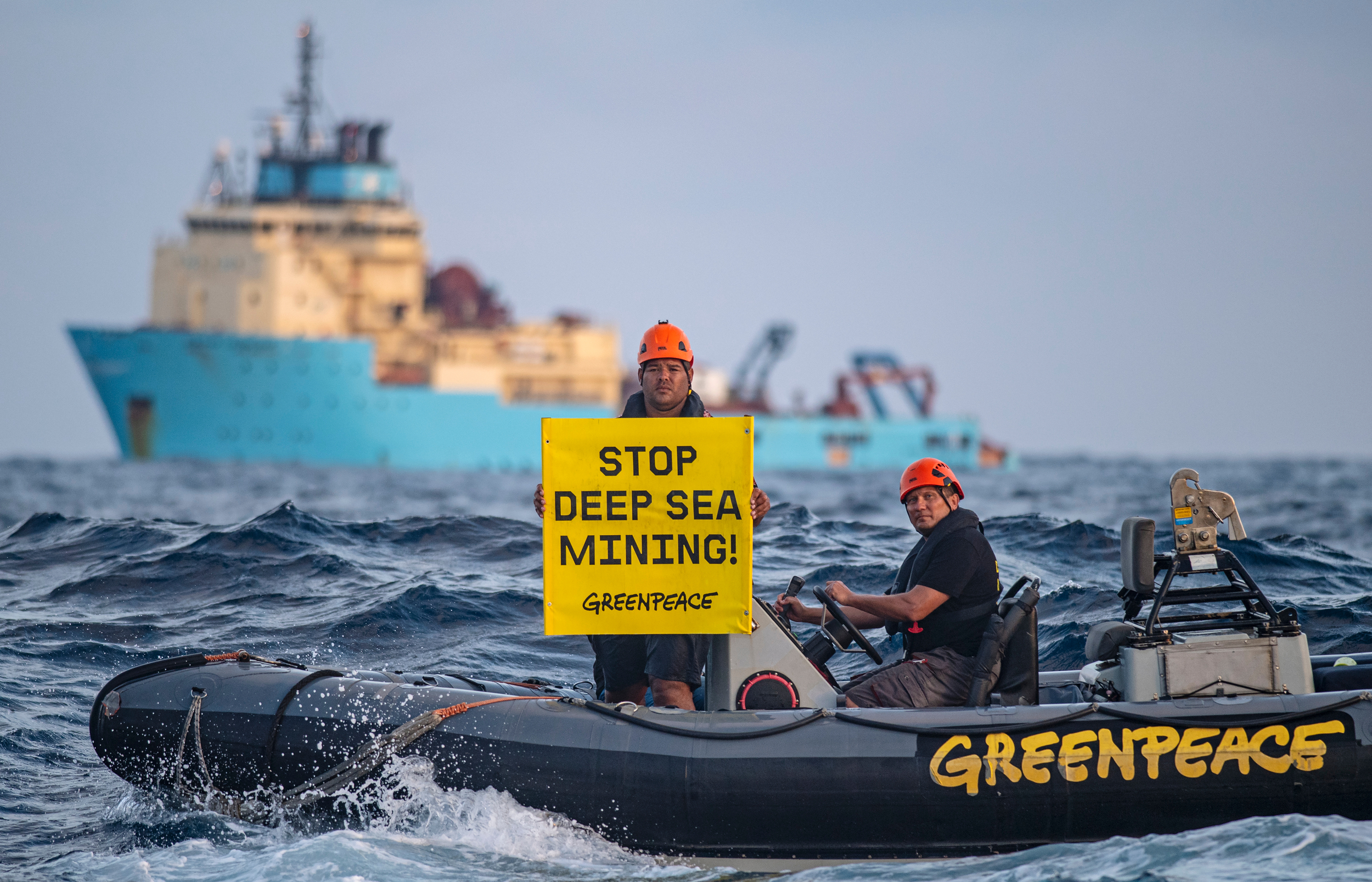
- Press Release
Greenpeace accuse UK government of losing control of deep sea mining exploration licences as parent company goes bust
Environmental group puts in symbolic £1 bid as UK licences auctioned off
Greenpeace UK lawyers have written to the UK government to express serious concern about its lack of control over two deep sea mining exploration licences that it sponsors via UK Seabed Resources (UKSRL).
UKSRL’s parent company, Loke Marine Minerals AS, recently declared bankruptcy and now its assets, which include the two exploration licences, are currently the subject of a fire sale under the rules of Norwegian bankruptcy. Together, the licences cover an area of the Pacific Ocean’s Clarion-Clipperton Zone larger than England [1].
Signs point towards this being a strategic bankruptcy to create a ‘phoenix company’ – a business created when the assets of an insolvent company are bought out of a formal insolvency process – given the only two bidders for the assets are Loke’s original founders and one of its main investors, TechnipFMC [2].
International law states that a sponsoring state must be able to demonstrate effective control over the holding company of any deep sea mining exploration licences [3]. The fact that the UK licences are being transferred between private entities, subject to a Norwegian bankruptcy process, behind closed doors and in a manner that appears to deliberately avoid company debts, shows the UK government has no effective control.
Greenpeace UK initially tried to purchase the licences in an attempt to protect them from any future mining.. But given the financial and legal risks involved, the organisation instead made a symbolic bid of £1 for the licences. As part of the bidding process, Greenpeace gained access to documents that show the government realises the risk this situation presents. In a seemingly panicked attempt to regain control and protect the licences, an email from the Department for Business and Trade to one of Loke’s founders, Walter Sognnes, urges him to restructure Loke as a UK holding company. The DBT official states the reason for this is that “Any sale of UKSR to a new parent company – and any UK decision to continue sponsorship – will come under significant scrutiny” [4].
The government’s continued sponsorship of these two exploration licences appears completely at odds with its public position in support of a moratorium on deep sea mining. Currently 32 countries, over 750 scientists around the world and major car, tech and finance companies oppose deep sea mining. The risks to the oceans include widespread, unavoidable and irreversible harm to habitats, marine biodiversity and coastal communities.
Greenpeace believes Loke’s bankruptcy presents an ideal opportunity for the UK government to clarify its commitment to ocean protection and its support for a moratorium by terminating the licences [5].
Erica Finnie, Greenpeace UK Oceans Campaigner, said:
“The tactics being employed by deep sea mining companies to stay afloat are even darker than the depths of the ocean they’re trying to exploit. Desperately clinging on to these licences while the industry crumbles represents a huge reputational risk for the government, as well as a grave danger to the international marine environment – and they know it.
“Deep sea mining is a dangerous industry faced with mounting scrutiny and diminishing demand. The UK government should stop hedging its bets and stand on the right side of history by terminating these licences immediately.”
Further documents expose warnings from the International Seabed Authority (ISA) that UKSRLis at risk of non-compliance with its contractual obligations. They also reveal that it has not paid its licence fee of USD 160,000 to the ISA which was due on 31 March 2025 – more evidence of the owners of UKSRL being unfit to hold these licences of international environmental importance.
The ISA’s mandate is to preserve the international seabed and control all mineral-related activities there.
ENDS
Notes to Editors:
The letter Greenpeace UK sent to the UK Government is available on request.
[1] The UK government sponsors two deep sea mining exploration licences through UKSR covering 133,000km2 of the Pacific Ocean. UKSR was acquired by the Norwegian company Loke Marine Minerals in March 2023, having previously been owned by US weapons company Lockheed Martin
[2] Offers in Norway are legally binding even before any meaningful due diligence can be conducted – the company is offered “as is”; and there appears to be apparently complicated intercompany claims and liabilities which makes it commercially impossible for a party not connected to the company to bid.
[3] Deep sea mining in international waters is governed by the Convention on the Law of the Sea (UNCLOS) which requires any company holding an exploration licence to be sponsored by a State. This is because companies are not bound by various international and environmental laws and the State has an obligation to ensure compliance.
[4] UNCLOS states that State sponsorship of ISA contracts is designed to ensure that the sponsoring State will ensure company compliance with the contract and environmental laws. It also indicates that the ISA will verify that any private company applying for a deep sea mining contract has the appropriate nationality or can be “effectively controlled” by the sponsoring State. There has been a lot of discussion at recent ISA meetings about the importance of a genuine link between the State and the contractor. Hence the UK government’s concern about ensuring the licences are held by a UK holding company. https://www.isa.org.jm/wp-content/uploads/2023/06/ISA_Effective_Control_Discussion_Paper.pdf
[5] The Exploration Licences cannot be assigned without consent from the UK Secretary of State (clause 23 of the Exploration Licences). The Secretary of State may revoke the licences on bankruptcy/insolvency of the holder of the Exploration Licences (clause 24).